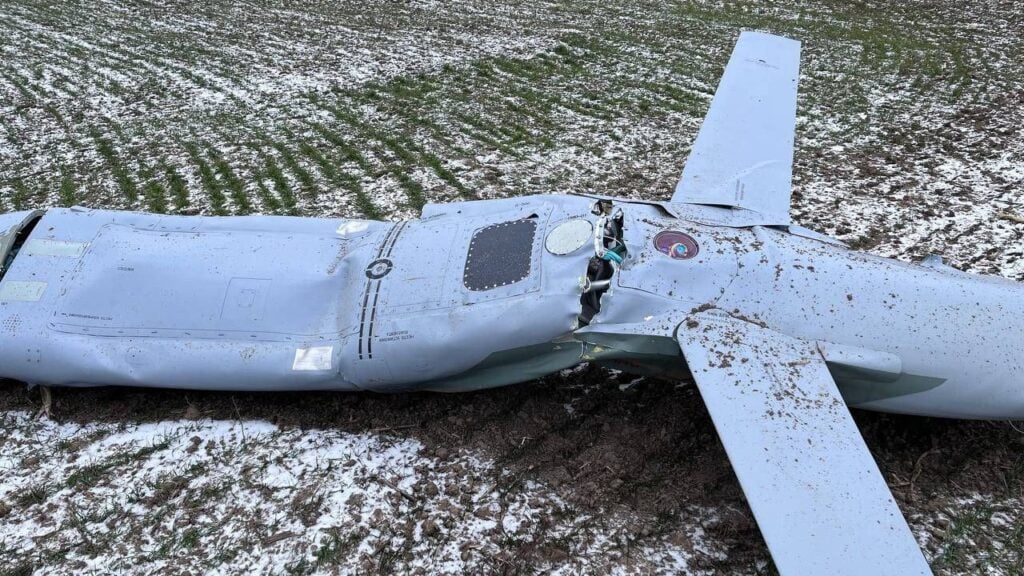
A Russian Kh-101 air launched cruise missile reportedly shot down by Ukraine air defenses. (Ukraine Air Force on Twitter)
WASHINGTON — The Defense Department and the Biden administration should consider reviewing current missile defense policy in the wake of the ongoing war in Ukraine, according to the White House’s nominee to take over US Northern Command/NORAD, Air Force Lt. Gen. Gregory Guillot.
Guillot’s comments came while responding to a question from Sen. Deb Fischer, R.-Neb., during his Tuesday Senate confirmation hearing as to whether the US should change current missile defense policy “to allow for the possibility of defending against limited missile attacks from either Russia or China.”
While noting that any such decision would be in the policy realm outside his purview as a military officer, Guillot indicated that he would welcome such a change, or at least, a review to consider it.
“That would be a policy decision, but I do think that it’s something we should look at, based on what we’re seeing in Ukraine and the way the Russians are using new weapons systems. They’re attacking civilian infrastructure,” he said. “[A]lthough the policy is set and has worked well for years, as our adversaries change their capabilities and the way they employ, I think our military should look at adapting and on a recurring basis assess the policy.”
Russia since this spring has been using both newly minted cruise missiles and even hypersonic missiles in its war to annex Ukraine. Many of those strikes have been against civilian targets.
Current US homeland missile defense policy, set during the Clinton administration and adhered to by every administration, despite some waffling during the Trump administration, allows only the deployment of a limited homeland defense capability — namely, the Ground-based Midcourse Missile Defense system with 44 interceptors based in Alaska and California — to block strikes from “rogue” nations with handfuls of nuclear-armed ballistic missiles, primarily North Korea and Iran.
Russia and China, with their much larger arsenals of nuclear-tipped ballistic missiles, instead are to be deterred from attacking the homeland via America’s own large nuclear weapons architecture. Any US missile defense systems deployed against these two nuclear powers, the policy rationale goes, would lead to an out-of-control arms race and raise the risks of a use-it-or-lose-it, first-strike mentality that could easily end in nuclear Armageddon by miscalculation.
In comparison, Regional defenses deployed abroad, such as Aegis Ashore, long have been explicitly designed to counter potential Russian and/or Chinese attacks against US troops and allies in Europe and Asia.
The Biden administration, in its October 2022 Missile Defense Review, held the long-standing line on the limited nature of homeland defense as targeting primarily North Korea, and potentially Iran. The review also recognized growing Chinese and Russian threats, pushing an approach that leans on “comprehensive missile defeat” across all domains to counter hypersonic and cruise missiles, as well as advanced drones.
The difference between “missile defense” and “missile defeat,” however, arguably is less than clear. Likewise, in recent years there has been somewhat of a rhetorical fog growing about the different targets of regional and homeland defenses against cruise and hypersonic missiles being developed by Russia and China.
For example, the Missile Defense Agency’s plans for the defense of Guam, which the US calls part of the homeland, are publicly stated as designed to counter Chinese threats. Further, Pentagon officials and lawmakers often cite Russian and Chinese threats to the homeland in discussions of new hypersonic defenses, such as missile warning/tracking radars and satellites, as well as the Glide Phase Interceptor that the Missile Defense Agency has deemed a regional system.












